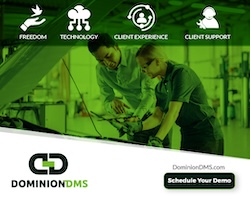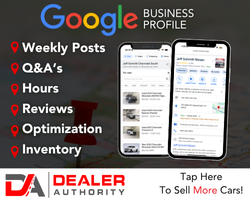Your customers are demanding. They want faster service, knowledgeable representatives, personalized treatment and a fair price. They want to communicate over multiple channels and they want information now. This pressure from customers is constant, therefore your constant value proposition is customer service. Good or bad, it tells customers how you truly feel about them and how much you care.
The market is fast-paced, over-served and under-differentiated. It can be difficult for dealerships to keep up. Dealerships who focus on customer service and providing an exceptional experience in every single interaction, gain an advantage in the marketplace. It’s the only thing your employees have to differentiate your company.
Customers choose a dealership based on one or more of these attributes: Price, Experience, Reputation, Location and Availability.
The customer’s experience, the way they are treated, and the quality of your interaction, are the one thing your employees should be focused on because they can’t control anything else.
Your employees don’t control price, the market controls pricing. You can create a perception that you’re cheaper than your competitor, and that’s good. It creates an opportunity for your employees to provide great customer service. They don’t set the prices though; the willing customer has the final say on price.
Customers will choose the lowest price dealer only when there is no difference in the level of service they expect to receive. When a dealership provides an exceptional experience, customers will pay more as long as your price is competitive. Sure, the inflatable gorilla is an attention grabber, but customers would rather have a knowledgeable sales or service representative.
It’s not your location that matters; it’s the customer’s location. (Think about it.) Your employees have no control over your location or your customer’s location. But customers have shown over and over again they will drive past a competitor to get to a dealership that provides a great experience: and a fair price. This applies to nearly all industries.
Your employees don’t control the availability of products or services. Again, the market influences availability through demand, which motivates the manufacturer to create the supply. You invest in the services by buying equipment and hiring and training employees. Your employees don’t decide what to put into inventory or the menu of services you provide.
Your reputation precedes you. Your employees certainly influence the future of your reputation but whatever’s out there at the time a customer makes a decision is out there. You can’t change that and neither can your employees.
There is one remaining attribute of dealership selection – the experience. However, the term experience is too broad. We need to narrow it down to what it really is, the quality of interaction with the customer. Maybe it’s in the showroom or service lane, or maybe not. More interaction with customers happens on the phone than any other method. Check it out. Add up all your service ROs, your showroom ups, your web leads and live chats for a month; then compare that to the number of times your phone rings and all the outbound calls coming from your dealership.
Customer service is a constant demand. Prices and availability fluctuate. Your reputation has ebb and flow and customers move around both in where they live but also where they work. The quality of interaction is a real time continuous indicator of how you’re doing.
It runs deeper still. When we talk about customer service it’s not free Wi-Fi and shuttle services or complimentary oil changes. These are not differentiators.
Exceptional customer service is defined by the quality of interaction when customers visit your showroom, service lane or website. Service is what happens when they call, or email and even chat with you online.
Since the telephone accounts for most of the interaction with your customers, your first steps to improvement should start with the telephone as well. Telephone etiquette is at the center of great phone processes. Simple rules like warm transfers, voicemail greetings, voicemail notifications, paging etiquette and call routing boost phone performance immediately.
Using a service-based language is a real differentiator in the auto industry. Customers associate the way they are treated with other services that treat them the same way. Phrases like “Certainly”, “I can help you with that right away”, “may I place you on a brief hold”, “thank you for holding” “is there anything else I can help you with today” and “thank you for calling BDC Motors” have a halo effect on your customers. They will assume that since you are good on the phone they can expect great treatment when they visit too.
Driver’s Village, a Syracuse area megadealer, handles over 20,000 service calls each month in their Customer Experience Center (their name for the BDC). Firas Makhlouf, Driver’s Villages Chief Information Officer sees this as 20,000 opportunities to wow a customer. Every call is handled with care. Remarkably, they transfer less than 15% of the calls to the service departments. Agents are trained to resolve customer needs in one contact and they end every call with “are there any other transformation needs I can help you with today” followed by “thank you for choosing Driver’s Village.”
The result is predictable. The shops are full, customers feel valued, and the phone doesn’t bog down service advisors. This allows the service advisors to pay attention and provide exceptional service to the customers in the lane.
Phone skills are just communication skills and they can be applied everywhere. Face to face, when composing an email or leaving a voicemail, in a text, personal video or a chat transcript, excellent communication skills make customers want to do business with you.
Another easy differentiator is to identify your customer. When you see a customer has done business with you before, don’t treat them like a prospect. They are your customer. This is easy enough with Internet leads but with phone customers you simply have to ask: have you done business with us before? Now you know if you are talking to a prospect or a customer. Accessing customer history while you’re on the phone will allow you to provide a more personalized experience which translates to a better experience for your customer.
In the end, everything matters.
Everything is marketing. Every phone call, every voicemail, every email, every text message and every dealer visit, in sales or service, matters. Communication is constant. Provide exceptional service, treat your customers really well when you communicate with them and you will master your only true constant value proposition.
The market is fast-paced, over-served and under-differentiated. It can be difficult for dealerships to keep up. Dealerships who focus on customer service and providing an exceptional experience in every single interaction, gain an advantage in the marketplace. It’s the only thing your employees have to differentiate your company.
Customers choose a dealership based on one or more of these attributes: Price, Experience, Reputation, Location and Availability.
The customer’s experience, the way they are treated, and the quality of your interaction, are the one thing your employees should be focused on because they can’t control anything else.
Your employees don’t control price, the market controls pricing. You can create a perception that you’re cheaper than your competitor, and that’s good. It creates an opportunity for your employees to provide great customer service. They don’t set the prices though; the willing customer has the final say on price.
Customers will choose the lowest price dealer only when there is no difference in the level of service they expect to receive. When a dealership provides an exceptional experience, customers will pay more as long as your price is competitive. Sure, the inflatable gorilla is an attention grabber, but customers would rather have a knowledgeable sales or service representative.
It’s not your location that matters; it’s the customer’s location. (Think about it.) Your employees have no control over your location or your customer’s location. But customers have shown over and over again they will drive past a competitor to get to a dealership that provides a great experience: and a fair price. This applies to nearly all industries.
Your employees don’t control the availability of products or services. Again, the market influences availability through demand, which motivates the manufacturer to create the supply. You invest in the services by buying equipment and hiring and training employees. Your employees don’t decide what to put into inventory or the menu of services you provide.
Your reputation precedes you. Your employees certainly influence the future of your reputation but whatever’s out there at the time a customer makes a decision is out there. You can’t change that and neither can your employees.
There is one remaining attribute of dealership selection – the experience. However, the term experience is too broad. We need to narrow it down to what it really is, the quality of interaction with the customer. Maybe it’s in the showroom or service lane, or maybe not. More interaction with customers happens on the phone than any other method. Check it out. Add up all your service ROs, your showroom ups, your web leads and live chats for a month; then compare that to the number of times your phone rings and all the outbound calls coming from your dealership.
Customer service is a constant demand. Prices and availability fluctuate. Your reputation has ebb and flow and customers move around both in where they live but also where they work. The quality of interaction is a real time continuous indicator of how you’re doing.
It runs deeper still. When we talk about customer service it’s not free Wi-Fi and shuttle services or complimentary oil changes. These are not differentiators.
Exceptional customer service is defined by the quality of interaction when customers visit your showroom, service lane or website. Service is what happens when they call, or email and even chat with you online.
Since the telephone accounts for most of the interaction with your customers, your first steps to improvement should start with the telephone as well. Telephone etiquette is at the center of great phone processes. Simple rules like warm transfers, voicemail greetings, voicemail notifications, paging etiquette and call routing boost phone performance immediately.
Using a service-based language is a real differentiator in the auto industry. Customers associate the way they are treated with other services that treat them the same way. Phrases like “Certainly”, “I can help you with that right away”, “may I place you on a brief hold”, “thank you for holding” “is there anything else I can help you with today” and “thank you for calling BDC Motors” have a halo effect on your customers. They will assume that since you are good on the phone they can expect great treatment when they visit too.
Driver’s Village, a Syracuse area megadealer, handles over 20,000 service calls each month in their Customer Experience Center (their name for the BDC). Firas Makhlouf, Driver’s Villages Chief Information Officer sees this as 20,000 opportunities to wow a customer. Every call is handled with care. Remarkably, they transfer less than 15% of the calls to the service departments. Agents are trained to resolve customer needs in one contact and they end every call with “are there any other transformation needs I can help you with today” followed by “thank you for choosing Driver’s Village.”
The result is predictable. The shops are full, customers feel valued, and the phone doesn’t bog down service advisors. This allows the service advisors to pay attention and provide exceptional service to the customers in the lane.
Phone skills are just communication skills and they can be applied everywhere. Face to face, when composing an email or leaving a voicemail, in a text, personal video or a chat transcript, excellent communication skills make customers want to do business with you.
Another easy differentiator is to identify your customer. When you see a customer has done business with you before, don’t treat them like a prospect. They are your customer. This is easy enough with Internet leads but with phone customers you simply have to ask: have you done business with us before? Now you know if you are talking to a prospect or a customer. Accessing customer history while you’re on the phone will allow you to provide a more personalized experience which translates to a better experience for your customer.
In the end, everything matters.
Everything is marketing. Every phone call, every voicemail, every email, every text message and every dealer visit, in sales or service, matters. Communication is constant. Provide exceptional service, treat your customers really well when you communicate with them and you will master your only true constant value proposition.
I live and breathe customer service! My number one goal will always be to bridge the gap between a business and it's customers. In my time at AllCall,...










Current Discussion Topics